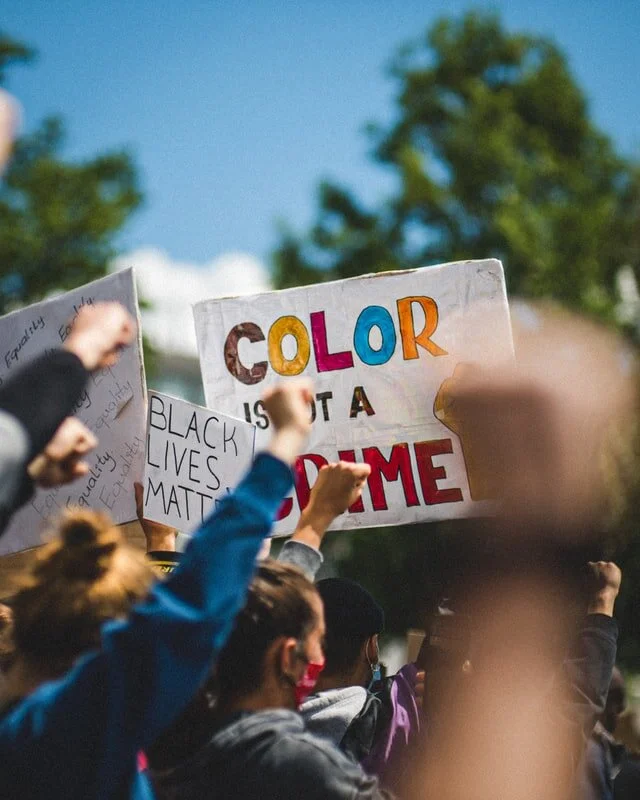"When You Know Better, Do Better..."
Photo by Mika Baumeister on Unsplash
If you’ve been reading this blog for any period of time, you’ll have noticed that I usually comment or reflect on the most major events of the day in some sort of way, either explicitly or implicitly. But I haven’t really talked about the protests that have been taking place across the country (and indeed the world) over the last couple of weeks.
I’ve wanted to, but, the truth is, I’ve struggled with how to best comment and provide my perspective within the construct of this platform. I didn’t want to engage in platitudes or some sort of pop psychology (or even “pop political commentary”) for the sake of it. I didn’t want to pretend to have better insight into the issue than those who are far better versed in these issues. The fact is that while many of us can sympathize, few of us can fully empathize. But I do have strong feelings here, so I thought I’d share a viewpoint, my own personal one.
I grew up (outside the US) as a minority and have experienced racism in different ways. I wouldn’t call it all consuming but it was there. In defined situations, I ‘knew my place’, so to speak. Likely because of that, as I learned about the Black experience in the US, I began to appreciate the sense of anger, injustice and unfairness that characterizes so much of their experience here. To be clear - I don’t mean this from the standpoint of comparing what I experienced to what they did (and do) go through, rather it provided me with a basis with which to understand the situation. I felt I understood.
What I realized, though, was that, while my heart was in the right place, I actually knew very little. As I said, my experience wasn’t all consuming, not in the same way. I didn’t live day to day being wary of the police or the government. I could walk down most neighborhoods at most times of the day without worrying about potential harm. But that’s clearly not the case for African-Americans here, certainly not across the board. (I don’t need to recount examples - by now, we’ve all seen or heard or read about them, and the history is evident for anyone who wants to take the time to learn.)
And a key part of my personal education has been my evolving understanding of one word that I’ve seen used consistently by the African-American community to express how they feel: “exhausted”. It’s taken me a long time to really accept the gravity and weight that’s associated with that word. For a long time, I’ve thought, how can so many (African-American friends and commentators) keep talking about these same issues, month after month, year after year, on social media and elsewhere, with the same level of passion - not just when serious events happen, but even when they don’t? Why is it that so much of the Black experience is filtered through this same lens? Isn’t it exhausting?
The answer, as I’ve learnt, is that it is indeed exhausting but it’s not as if it’s a choice. It’s a relentless reality. And, if I’m honest, my thinking in this way was actually more a reflection of my lack of understanding, because what I was really saying was that it was exhausting for me to read about it. But that was down to me, it was my problem - perhaps not for lack of good intent, but a problem all the same. I clearly wasn’t asking the right questions, or doing the work to understand more deeply. And as I learn more, I realize there are many instances where I cannot relate to the historical context or to the specific personal experience. These are subtleties that, unless you understand the history, you cannot recognize the systemic nature of the bias at play.
So, what I can do is not take these situations at face value, and work harder to understand. This is why we’re hearing the phrase “listen and learn” a whole lot more, which is what we all need to be doing.
There are two parts to this, at least in my mind.
The first is developing a deeper appreciation of the African-American experience, which is unique in many ways. To understand more about why we talk about systemic racism, how it is ingrained in how we think, act and do. Where we translate these biases into our realities, either willingly or unwittingly? And then, of course, what we can do to change - ourselves, our children and our communities.
In doing so, we should be able to do the deeper work that is needed. And that, to me, is getting to understand this idea we tend to have of the “other” - those who are different, not like us - and why we think in that way. Of what it actually means, and why we mean it to be that way. Of what that says about our own shortcomings and frailties and prejudices and insecurities. Of what that says about who we are - and whether we are willing to accept that, or hide behind a veil of seclusion or exclusion - because we’re ‘different’ or ‘superior’ or ‘better’.
“I imagine one of the reasons people cling to their hates so stubbornly is because they sense, once hate is gone, they will be forced to deal with pain.” ― James Baldwin, Notes of a Native Son
This isn’t just about skin color, of course, because there are “others” everywhere (depending on our definition) if we look for them. The real questions are, why are we looking and what is our intent? Is it to identify and exclude? Or it is to understand and value the diversity?
“Do the best you can until you know better. Then when you know better, do better.”― Maya Angelou






